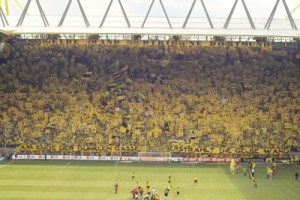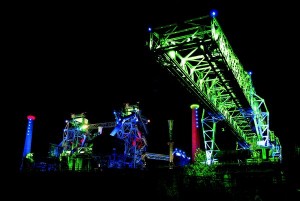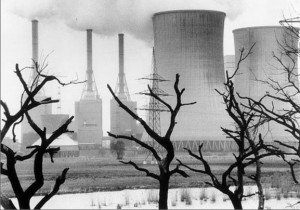 Graduate students from across Canada are invited to apply to participate in an interdisciplinary ten-day study tour (26 April to 5 May 2010) to the Ruhr region—formerly the industrial heart of Germany, and in 2010 the European Capital of Culture. Supported by the German Academic Exchange Service (DAAD), The Canadian Centre for German and European Studies at York University / Le Centre canadien d’études allemandes et européennes at Université de Montréal, the tour will operate under the title “From Coal to Culture – The Ruhrgebiet in Transition” and will provide unique first-hand insights into the remarkable changes that have been taking place in what was once home to German heavy industry. In addition, successful applicants will have the opportunity to complete an internship in the Ruhr region within an organization or institution working in area(s) related to the themes of the study tour.
Graduate students from across Canada are invited to apply to participate in an interdisciplinary ten-day study tour (26 April to 5 May 2010) to the Ruhr region—formerly the industrial heart of Germany, and in 2010 the European Capital of Culture. Supported by the German Academic Exchange Service (DAAD), The Canadian Centre for German and European Studies at York University / Le Centre canadien d’études allemandes et européennes at Université de Montréal, the tour will operate under the title “From Coal to Culture – The Ruhrgebiet in Transition” and will provide unique first-hand insights into the remarkable changes that have been taking place in what was once home to German heavy industry. In addition, successful applicants will have the opportunity to complete an internship in the Ruhr region within an organization or institution working in area(s) related to the themes of the study tour.
From Coal to Culture: The Ruhrgebiet in Transition
Study Tour to Germany, April 26 – May 5. 2010
The IBA Emscher Park Duisburg by Night
The Ruhrgebiet is one of the largest urban agglomerations in Europe and is inhabited by some 5.3 million people in such notable German cities as Duisburg, Oberhausen, Essen, Gelsenkirchen, Bochum, and Dortmund. Once Europe’s largest industrial region, the Ruhrgebiet has undergone a period of dramatic change since the 1960s as the coal and steel industries traditionally at the centre of the life in the Ruhr have been buffeted by the dramatic changes.. While the initial response to the decline of these traditional industries was denial, since the 1980s local decision makers and residents have come to understand the structural changes taking place in the Ruhr economy as an opportunity for a fundamental economic, social, and cultural modernization. Increasingly, new high-tech industries, research labs, and centres of knowledge have emerged to replace the old mining pits and smelters. In addition, cities throughout the Ruhrgebiet started to musealize their industrial heritage turning these sites into attractive, fascinating tourist sites.
Nothing better represents the dramatic and often astonishing change that has taken place than the fact that the city of Essen—representing the whole Ruhrgebiet—has been selected the European Capital of Culture 2010. Today the Ruhrgebiet serves as a model for the radical economic, social, and cultural transformation of a former industrial region without the denial of its historical roots.
Our Study Tour will deal with the political, economic, social, and cultural implications of the changes and try to assess the successes as well as the challenges still facing the Ruhr region. In order to get as many different perspectives as possible, the group will meet with individuals and institutions from a variety of backgrounds and interests. Amongst those we intend to speak with are politicians from the state, and municipal levels, representatives of private business and unions, academics, civic activists, urban experts, engineers, marketing strategists, artists, etc.
We will particularly focus on the following inter-related themes:
1) Industrialization – De-Industrialization – Industrial Culture: Industrialization in the 19th and early 20th centuries as well as de-industrialization processes that have occurred since the 1960s have driven structural development in the Ruhrgebiet. We will consider the economic, social, and cultural consequences of these processes as well as the current reinvention of the Ruhrgebiet on the basis of industrial heritage.
2) Industrial and Post-Industrial Forms of Urbanity: Industrialization has shaped the urban landscape of the Ruhrgebiet. We will explore the very specific forms of urbanity resulting from this as well as present-day activities to revitalize or even to create new urban centres.
3) Renaturalizing Industrial Landscapes: The massive exploitation of natural resources has had a deep, sometimes disastrous effect on the environment. Since the 1980s and the beginning of the IBA Emscher Park project, a series of “Landscape Parks” have been created connecting pre-industrial, industrial, and post-industrial zones together to form a unique cultural and natural landscape.
4) Migration and Integration in Past and Present: As Germany’s industrial heartland, the Ruhrgebiet witnessed a massive influx of Germans and non-Germans alike. Recently, the trend has been reversed with the Ruhrgebiet losing population. The importance of migration in general will be explored as well as the mechanisms of integration and disintegration with a particular focus on migrants from non-German backgrounds.
5) Global Challenges and Regional Identity: In the process of its formation as a region, the Ruhrgebiet developed its own identity expressed in specific forms of labour relations, working-class associations, language and literature, culture, and last, but not least, soccer. We’ll take a closer look at the ongoing process of production of meaning and identity in the context of past and current challenges like industrial decline and globalization.
6) Towards a Knowledge Society: Science and Education: With the largest density of academic institutions in Europe, the Ruhrgebiet has become an enormous source of science and education. We’ll explore the role of these institutions in the restructuring of cities and the entire region as well as the current challenges they are facing.
 The “Yellow Wall” or South Stand of Dortumund’s legendary Westfalenstadtion (Now Signal Iduna Park)
The “Yellow Wall” or South Stand of Dortumund’s legendary Westfalenstadtion (Now Signal Iduna Park)
Applicants
The Study Tour is open to all students currently enrolled in a graduate program at a Canadian university. If you do not have a legal status in Canada as citizen or permanent resident please contact us before you apply.
While facility in German is not a requirement, student participants should feel comfortable working in a German-speaking environment.
To augment the support from the German Academic Exchange Service, student participants are asked to contribute $500 to help pay for transportation and accommodation during their ten days in Germany. Meals will be participants’ responsibility.Successful applicants will be provided an extensive introductory reader and are obliged to prepare for the Study Tour by participating in an online-seminar about four weeks ahead of departure. Moreover, they will be expected to make a substantive contribution to the success of the tour both by serving as a discussion facilitator during one of the tour’s half-day modules and contributing to some kind of joint publication upon the tour’s completion. (The form of such a contribution is open and potential participants are encouraged to contemplate what form this might take (text, photos, film, etc.).
Please indicate in your application if you’re seeking course credit for participating in the study tour and clarify the requirements with your home institutions well in advance of the tour.
How to Apply / Further Information
Interested students are asked to submit the following:
Letter of Interest outlining why you wish to participate and how, if relevant, the tour would complement your graduate program (2 pages max.)
Transcripts from Post-Secondary Study (print-outs or copies acceptable)
Documentation demonstrating German-language facility (e.g. high school or university transcripts, DaF test results, etc.)
In case you are interested in an internship (at least four weeks of duration) following the study tour, please indicate your specific field of interest in your application.
The deadline for applications is January 22, 2010
Completed applications should be submitted electronically to the following addresses
Prof. Marcus Funck funck@yorku.ca
and
Prof. Ulrich Ufer ulrich.ufer@umontreal.ca
Please contact us also in case of questions about any aspect of the study tour.



